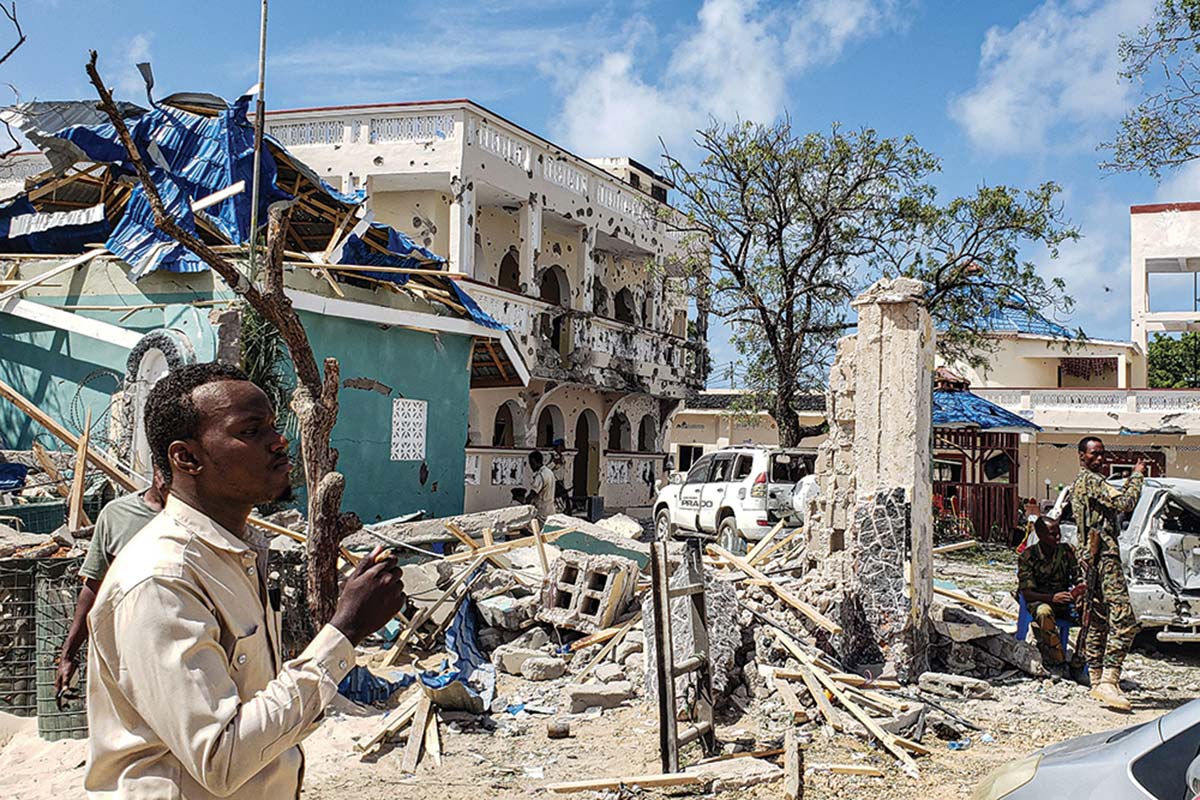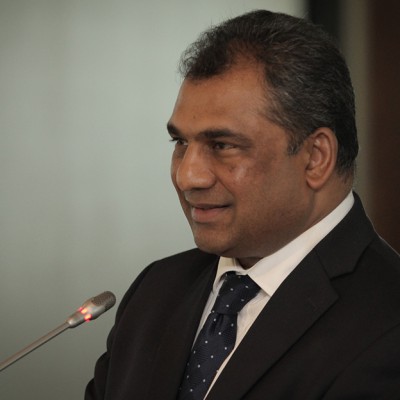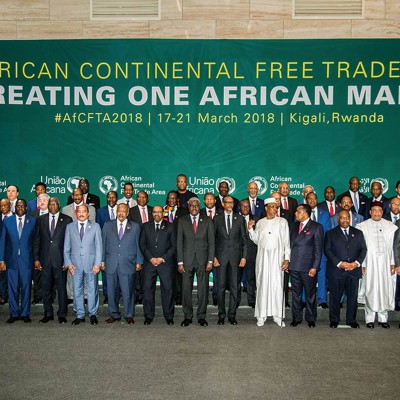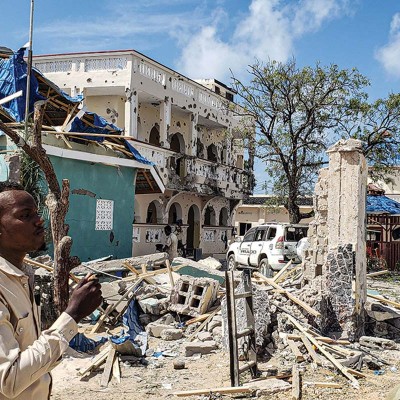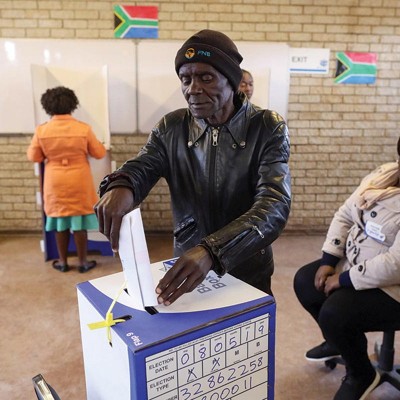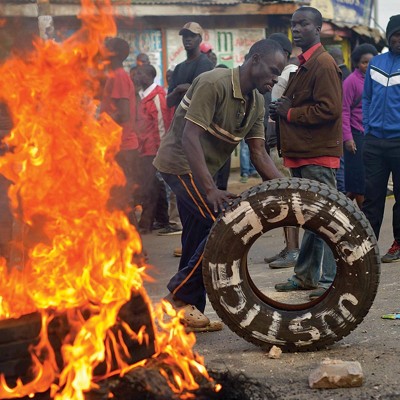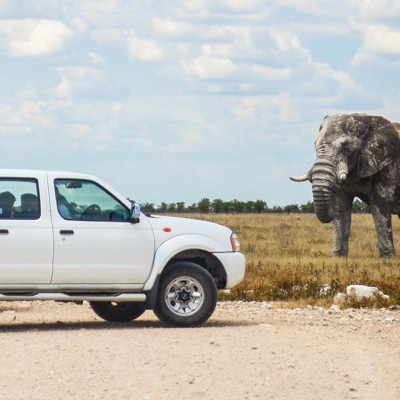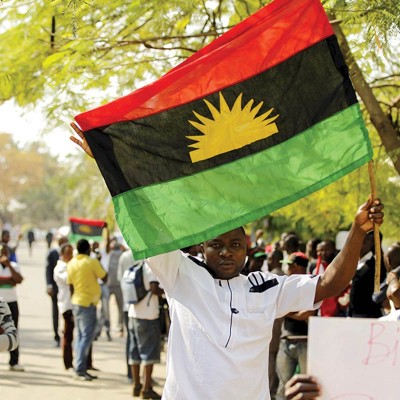Introduction
In 2017, the Global Terrorism Database reported 2 402 incidents of terrorism in Africa.1 Perhaps this number is not shocking when considering the extensive international media coverage over the past decade, displaying headlines detailing terrorism-related violence erupting in African countries such as Mali and Libya. Even so, this number is marginally lower than the annual tally over the past five years.2 Counterterrorism strategies by African governments, foreign powers such as France, and multilateral efforts from the African Union, among others, have contributed to the decline. However, to begin to disregard terrorism as an extreme risk on the continent would be a grave mistake. The threat must be considered not only for its intensity, but for its reach as well.
Given the pervasiveness of terrorism in North Africa and the Sahel region, international scholars and practitioners have given their attention to analysing and mitigating the threats in these regions. Yet, recent terrorism-related violence in the eastern Democratic Republic of the Congo (DRC), Mozambique and Tanzania demonstrates the need to carefully consider the risk of terrorism spreading south-east. The key characteristics that have rendered many of the North African and Sahel countries vulnerable to increased terrorism also exist in southern and eastern Africa; these include poverty and unemployment/underemployment, fragile state governance and civilian grievances.
Considering further the poor response to terrorism by the DRC, Mozambique and Tanzania governments, better response mechanisms for this region are needed. Based on the insufficient capacity to protect against the nascent but potentially expanding terrorism, this article argues for urgent attention to be brought to building state resilience that will successfully confront and reverse the spread of terrorism in southern and eastern Africa. This requires developing strong leaders who can make necessary socio-economic and political system changes.
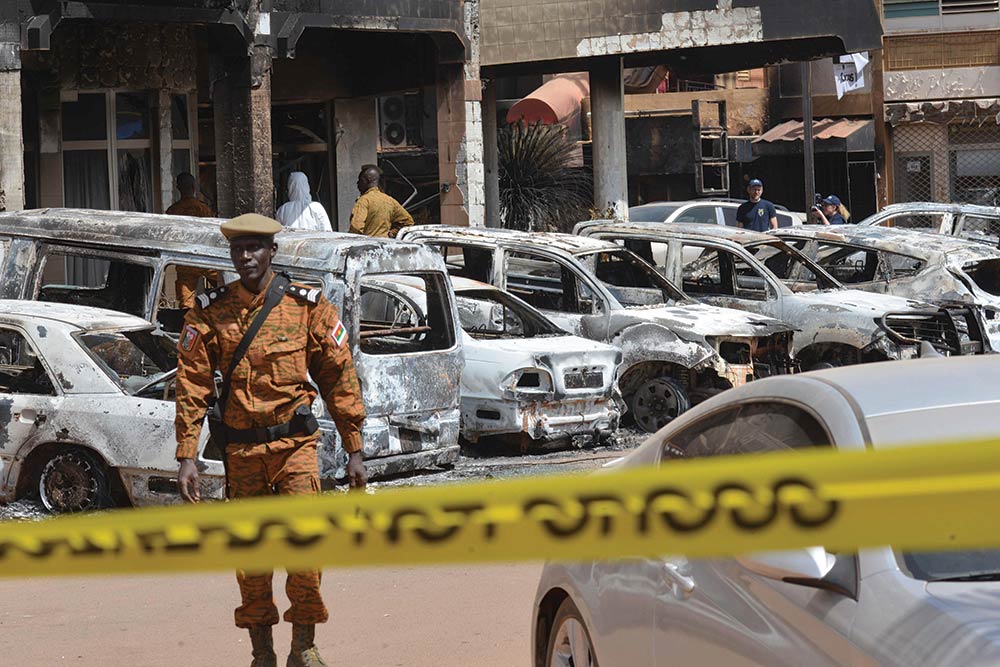
Terrorism: International to Southern and Eastern Africa
The Counter Extremism Project broadly defines terrorism as “the use of violence by a non-state actor to pursue a political end or to intimidate civilians”.3 The global landscape has witnessed the rise of this non-state actor violence in the post-Cold War era. While terrorist groups exist at a localised level on nearly every continent, two organisations in particular have developed a powerful international following: al-Qaeda, and the Islamic State (IS). Both groups are Islamic extremist groups working to establish a worldwide Muslim state that imposes Islamic law. They have been holding territory, establishing sociopolitical structures and conducting violent attacks. Although both groups originated in the Middle East, their influences have spread globally. Most notably, these groups have developed affiliates in the North African and Sahel regions, such as al-Qaeda in the Islamic Maghreb (AQIM), a wealthy terrorist organisation responsible for kidnappings and formally tied to al-Qaeda since 2006.4 Considering the presence of AQIM, among other organisations, these regions have become plagued by extremist violence.
Africa is witnessing a newer trend in Islamic extremism, as these groups have also spread further south-east on the continent. Three notable cases of this can be highlighted in the eastern DRC, Mozambique and Tanzania. In April and June 2019, IS claimed its first two attacks in the eastern DRC. It reportedly used the Allied Democratic Forces (ADF), a long-existing rebel group based in the country, as a proxy group to carry out the attacks. Although originally set up to fight the Ugandan government, which they believed to be discriminating against Muslims,5 the ADF has instead exploited the local grievances of civilians in the eastern DRC,6 a region devastated by continual violence brought on by contestation for control over natural resources, an Ebola crisis and lack of government provisions. The ADF has implemented structures such as schools and healthcare facilities for citizens. Offering social services to support communities where the state is absent has legitimised the group’s authority over citizens, because their needs are being fulfilled. While the DRC government has managed to weaken the ADF over the past decade,7 the new official tie to IS has strengthened its threat since IS can offer the ADF extensive funding, fighters and other resources.
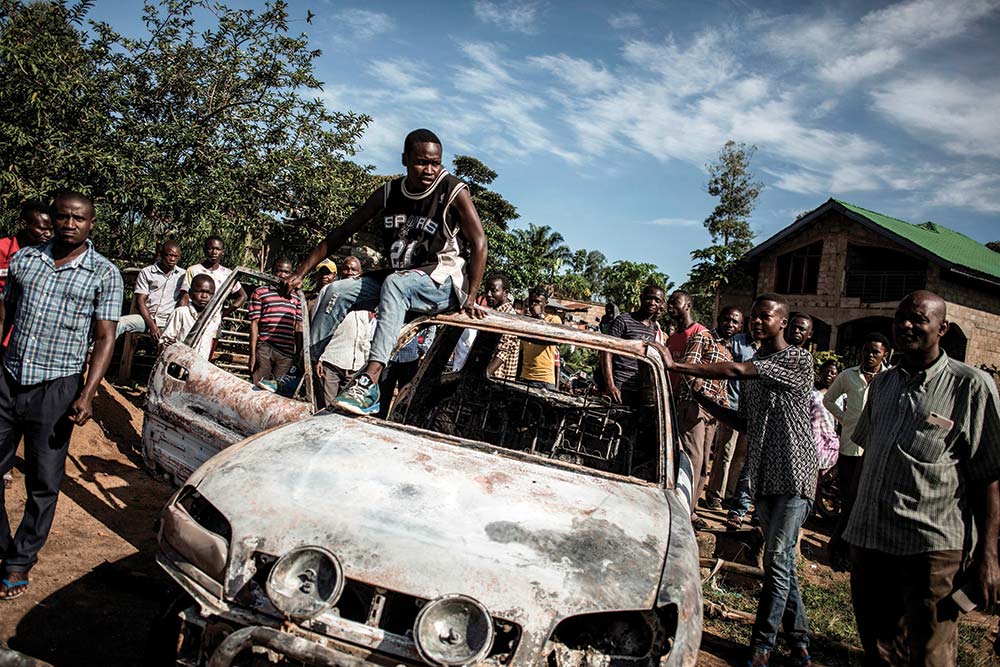
In Mozambique, Ahlu Sunna Wal Jamaa (ASWJ) has carried out violent attacks in Cabo Delgado, a Muslim-majority province in a predominantly Christian country. While it is flush with resources worth billions, such as rubies and natural gas fields,8 the people of Cabo Delgado are extremely poor. Locals have connected ASWJ to al-Shabaab, although the potential tie is hazy.9 Various causes of the violence have been referenced, including a struggle by the elite for Cabo Delgado’s natural resources or socio-economic grievances.10 Regardless, the group has recently made its presence known in the province – the Armed Conflict Location and Event Data Project reports 37 violent events involving ASWJ in 2018.11 While making some effort to suppress the violence in the region, Mozambique authorities have ineffectively dealt with the threat and have been accused of wrongful arrests and human rights abuses,12 which have propelled even more recruits to join the ASWJ.
Against claims of the eradication of terrorists in Tanzania, some assert that al-Shabaab continues to maintain a relatively low presence.13 In particular, Tanzania’s semi-autonomous Zanzibar island is a hotspot for historical grievances by Muslims. They are the majority religion on the island, while the country as a whole is mostly Christian – similar to Cabo Delgado. Civilians there claim that they have been disadvantaged by the government. While no official ties have been made to the increase in domestic terrorist attacks in the last half-decade, some evidence points to a potential presence of al-Shabaab in Tanzania; this includes authorities discovering al-Shabaab propaganda and training materials in the homes of operatives.14 On the other hand, IS can be considered a threat, given the publication of a video in 2016 by six men claiming to represent IS’s East Africa branch in Tanga.15 Tanzania has passed national acts for combating terrorism, but has yet to engage fully with regional or international powers to suppress the terrorist threat within its borders.16
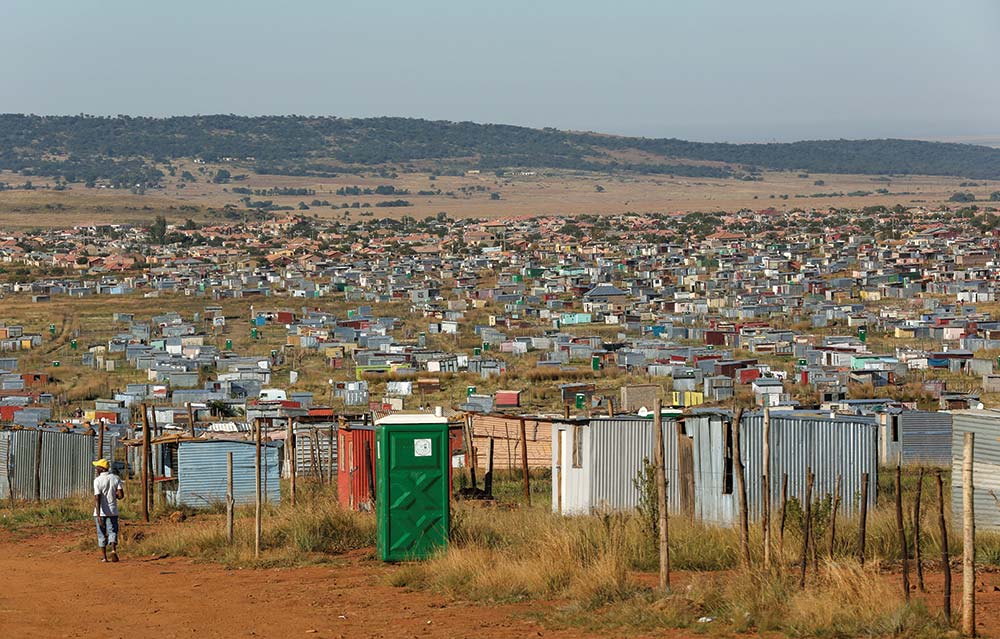
Common Trends and a Different Challenge
In considering the spread of terrorism to southern and eastern Africa, it is important to examine the commonalities of these countries with North Africa and the Sahel region that make them vulnerable. Three trends worth noting are poverty and unemployment, poor state governance, and civilian grievances.
First, North Africa and the Sahel, as well as eastern and southern Africa, suffer from some of the highest rates of poverty and unemployment in the world. The International Labour Organisation reports that North Africa’s unemployment rate is expected to sit around 11.8% until 2020, with its youth unemployment rate expected to extend over 30% in 2019. Although the 2018 aggregate unemployment rate in sub-Saharan Africa was significantly lower (5.9%), the extreme working poverty rate was 37.9%, which underlines high rates of underemployment.17 Minimal economic opportunities, particularly for youth, increase their willingness to join terrorist groups, especially when under false pretences they are given purpose and provisions for their participation. This has contributed to the rise of terrorism in North Africa and the Sahel, as well as now in eastern and southern Africa.
Second, states with poor governance generally do not have a monopoly on violence and are vulnerable to the actions of non-state actors. Continuous conflict, such as in Sudan; rival ethnic or religious competition, such as in Nigeria; or authoritarian rule, such as in Libya, have weakened government stability in many North African and Sahel countries. Weak or corrupt governance limits a state’s ability to provide basic public services, which include education, health and security, and further increases the risk of human rights violations and/or discrimination. These same patterns exist in the DRC, Mozambique and Tanzania, as each country struggles with its state legitimacy and service provision issues.
States that cannot provide proper services or security for its citizens are at risk of an increase in terrorism because these groups offer an alternative source for services and security. For example, al-Shabaab in Somalia controls the socio-economic and political services for its territories. The same trend exists in the three southern and eastern countries discussed – for instance, the ADF in the eastern DRC took over provisions for schools and healthcare centres in provinces where weak governance did not reach. After offering basic support for the most marginalised people, the legitimacy of these extremist groups is enhanced.
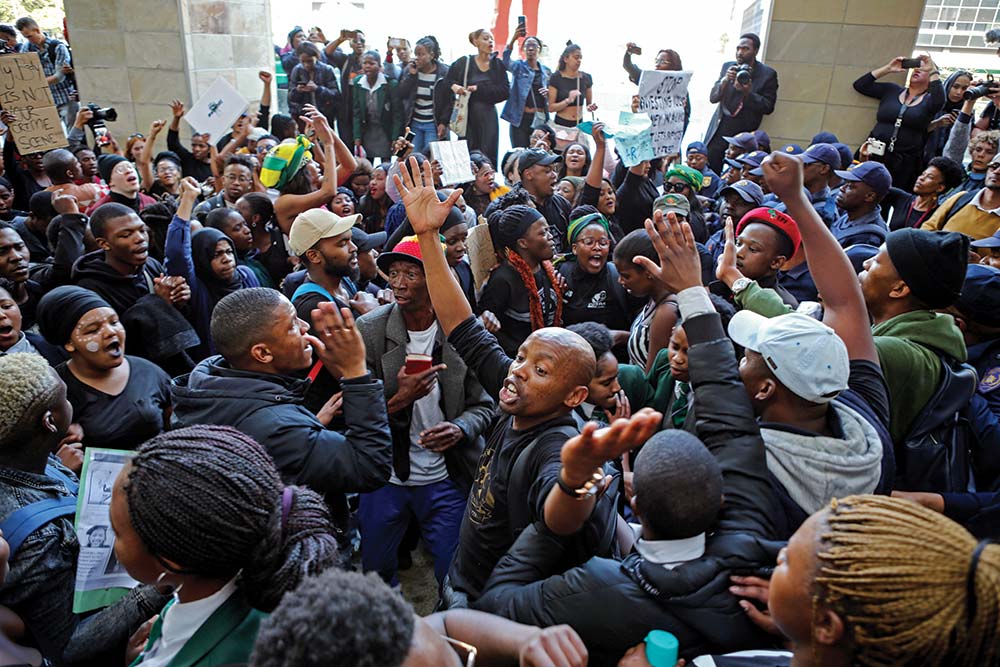
Finally, social grievances left unaddressed weakens national security and stability, providing opportunity for terrorism to enter and grow. Colonialism developed the modern political, economic and social systems that manifest inequality by prioritising certain groups over others. In many countries, these systems are also swamped with further corruption. In addition, poor economic growth and/or continuous violence in most countries across the continent (also legacies of colonial systems) have left governments unable to provide for their people.
Narratives of grief directed at the government are created when patterns of inequality and poor service provision seemingly target a specific group within the population, such as Muslims in Tanzania or other minorities. As a result, those civilians who feel victimised lose trust in the government. They begin to look for other sources of authority, not only to provide services and security but also as a means for achieving justice, if not vengeance. A narrative exists in Zanzibar that the people have suffered under a Christian-dominated Tanzanian government, while those in Cabo Delgado believe that the Mozambican government exploits the natural resources in the province without benefit to the locals, leaving them impoverished and unemployed.
Despite these three characteristics that can be linked between the regions, the eastern DRC, Mozambique and Tanzania present a different case. Terrorism in many North African and Sahel countries (and Somalia) has already developed significantly, while it is only beginning to seep into these three countries. This is of importance as it demands a different strategy for counterterrorism in the region. Beyond the focus on suppressing the terrorism already in effect, more effort should be placed on building state resilience to protect against extremism.
State Resilience: A Counterterrorism Strategy
The Organisation for Economic Co-operation and Development (OECD) defines resilience as “the ability of households, communities and nations to absorb and recover from shocks, whilst positively adapting and transforming their structures and means for living in the face of long-term stresses, change and uncertainty”.18 Resilience is not resistance, since resilience involves adaptation and transformation. It is also not an outcome – it is an ability.19
Moreover, the OECD specifies that while shocks refer to when “…risk becomes reality…”, stresses are “…long-term trends, weakening the potential of a system and deepening the vulnerability of its actors…”20 Terrorism, in this sense, is a shock. Environmental degradation is but an example of a stress. Resilience to shocks and stresses is strengthened by three capacities: absorptive (preventing and mitigating negative impacts), adaptive (modifying systems to take advantage of current opportunities and prevent future damage), and transformative (creating new systems).21 Any state can be threatened by shocks or stresses, but resilient states can absorb, adapt and transform.
To exemplify state resilience, one could look at the shock of a climate-related disaster. Pakistan is host to perpetual heatwaves and drought, resulting in lives lost yearly. Despite this, the death toll spiked once again this summer due to severe temperatures, highlighting the country’s vulnerable healthcare system and the lack of significant mitigation measures against climate change-related heatwaves. On the other hand, the Netherlands, a country historically threatened by flooding but now facing a long-term stress of rising sea levels due to climate change, has demonstrated an absorptive capacity to complete complex dam-building projects, an adaptive capacity to form urban renewal programmes against climate change, and a transformative capacity as cities such as Rotterdam seek to develop themselves as places for “environmental ingenuity”.22
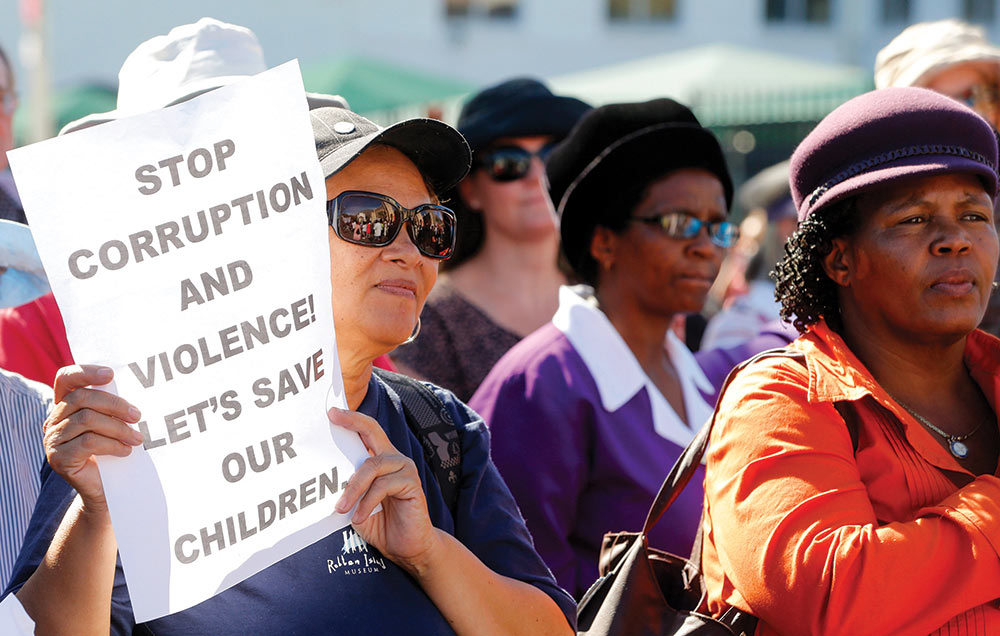
Looking at the shock of terrorism, there have been IS attacks in countries such as Denmark and Australia, yet these countries are not under a realistic surge of terrorism takeover. This is because their socio-economic and political systems are resilient: most citizens perceive the governments as legitimate, they can provide good public services to most people, unemployment rates are low, social relations are generally positive, and so on. The DRC, Mozambique and Tanzania currently do not exhibit this resilience.
Building resilience in these three countries requires reshaping systems that can absorb, adapt and transform the terrorism shock. More specifically, this implies addressing these countries’ most urgent problems that render them vulnerable, such as poverty and poor employment, bad governance and grievances. In their book Making Africa Work: A Handbook for Economic Success, Greg Mills, former Nigerian president Olusegun Obasanjo, Jeffrey Herbst and Dickie Davis highlight the need for an entwined development of both economies and good governance in Africa to strengthen such countries. They argue that this must be done through radical changes in economic/political systems and strong democratic leadership. The book is regarded as a “blueprint” for African leaders,23 and its perspective frames the recommendations made in this article for building resilience in the DRC, Mozambique and Tanzania – and on the African continent as a whole.
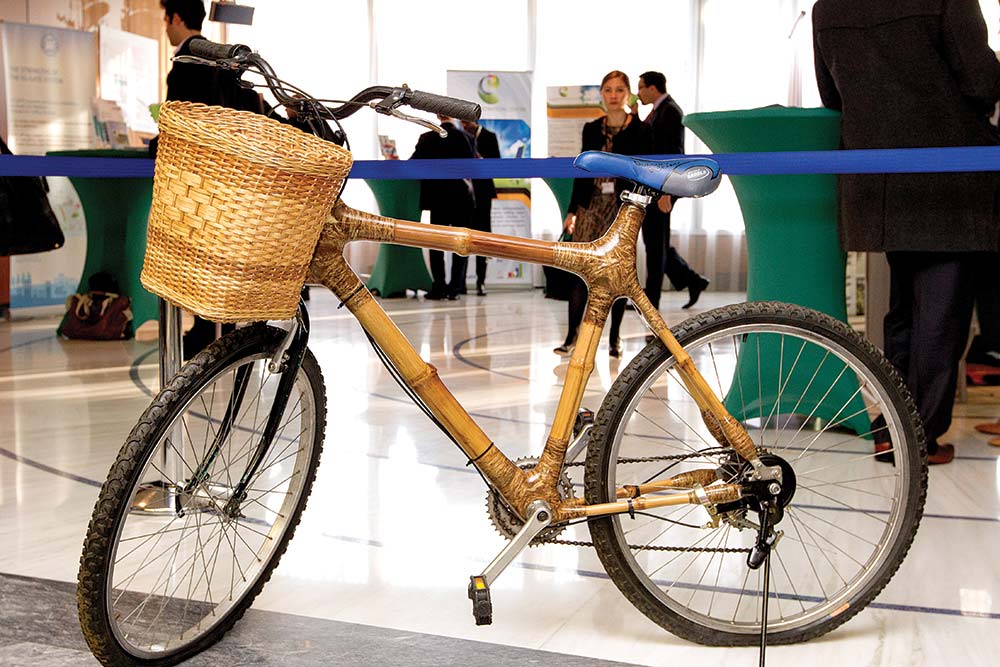
Recommendations
Reflecting on the high rates of poverty and underemployment driving vulnerability and increased terrorism, economic growth is needed for creating resilience. Mills et al suggest that there must be an increase in jobs with higher salaries in urban areas to meet the rising number of youth and the rapid urbanisation in these countries.24 In the short term, there should be more financial support and energy devoted to improving education and skills training, as well as an increase in programmes geared towards opening more entrepreneurial opportunities. Examples of this in Africa have included Booomers, a sustainable bamboo bike company in Ghana, and Secret Grand-Mère, which allows Mauritian women to sell their herbal products. These entrepreneurs must be transformed into stronger supporters of the economy to both widen and improve economic benefits in these three countries. In the long term, economic systems must be restructured to include the marginalised, such as women, as the connection between the economic empowerment of women and stabilised economic growth is internationally recognised.25 A well-run economy decreases socio-economic grievances and increases trust in government. In places such as Cabo Delgado and Zanzibar, this would build resilience against terrorist groups that exploit such vulnerabilities.
Moreover, building resilience in these countries requires creating good governance simultaneously with economic growth. Poor public service delivery is rooted in far more than low economic capacity or no financial aid, but also stems from uneven sociopolitical systems and corruption.26 Some economists, such as Dambisa Moyo, go further to suggest that foreign aid is harmful because it only contributes to corruption and civil conflict, and fosters dependence on foreign powers.27 Overcoming economic grievances will require restructuring poor governance. At a high level, governments must begin making policy and systematic changes that limit the room for corruption, increase equity in public service distribution, and expand government presence (via security and services) throughout the country. But moreover, for preventing violent extremism, the United Nations Development Programme (UNDP) underlines strengthening local government capacities and increasing participatory decision-making.28 Stronger political systems allow the government to be seen by citizens as legitimate, and complements economic growth – this develops resilience against terrorist groups.
Finally, the need to build new systems to address grievances has not received enough attention from scholars and practitioners. Building resilience requires outlets for the expression of former injustices, to allow civilians to process the grievances they have felt from the past. For the DRC, holding a truth commission could address the decades of civil conflict that has shattered the country. Charles Villa-Vicencio, who worked on South Africa’s Truth and Reconciliation Commission, suggests that truth commissions can break the silence on human rights abuses, develop a culture of accountability, uncover causes of violence and begin community reconciliation.29 In Tanzania and Mozambique, reparations to victims of discrimination and community projects promoting social reconciliation can aid in tackling grievances. Fostering social harmony builds a transformative capacity for resilience against terrorism by limiting grievances that can be taken advantage of by global terrorist influences.
Addressing failing systems would bolster the resilience capacities of these southern and eastern African states toward the terrorism shock – specifically by limiting grievances and increasing government legitimacy, since these issues make these states vulnerable to terrorism. Resilience protects against the internal growth of terrorism, but also breeds the state governance needed for effective security systems and border protection for mitigating external threats of terrorist attacks. The question is, how do these countries create good leadership to carry out these recommendations?
Southern and eastern Africa states have their fair share of poor leadership. This is the result of colonial systems that damaged the current sociopolitical atmosphere. There are leaders in power who do not appear to have the political will to make the necessary changes in their country. There are leaders still attempting to gain more authority over their sovereignty due to historical political instability, such as President Mohamed Abdullahi Mohamed in Somalia. And some leaders merely have yet to make any significant change, such as President Emmerson Mnangagwa following his takeover of Zimbabwe after Robert Mugabe’s devastating 30-year rule. Leadership in the three cases examined has its challenges, too: Tanzania’s John Magufuli faces human rights abuse accusations, the DRC’s Félix Tshisekedi rose to power potentially illegitimately and struggles to stabilise a severely unstable country, and under Filipe Nyusi’s leadership, Mozambique mishandled once-successful foreign investment, leading to an economic crisis.30 Nyusi’s political party has also been accused of fraud.31
Therefore, this article’s central recommendation is for concerted and increased investment in strong leadership in southern and eastern Africa. This requires more positive external incentives, similar to the Ibrahim Prize for Achievement in African Leadership, which awards exceptional former African leaders with US$5 million. Heightening accountability measures in regional organisations, such as the Southern African Development Community (SADC), can hold leaders to urgent action for resilience. Similarly, good leaders can strengthen the ability of regional organisations to curb terrorism all over Africa. International and regional powers, multinational organisations and non-governmental organisations must invest more finances and energy into leadership training, workshops and dialogues at both the high and low levels. The World Economic Forum argues that Africa needs “leadership development systems”, and to be effective, the skills growth for these leaders-in-training must bear in mind the socio-economic realities and leadership culture of the countries they come from, as well as be mindful of the easier access elite youth could have to these training opportunities.32 Investment in future leaders is crucial, and there must be good efforts made to train them inclusively and effectively.
With good leadership, the socio-economic and political recommendations made in this article have hope for success. Through this restructuring, state systems can better absorb, adapt and transform the shock of terrorism.
Conclusion
This article has highlighted the trends fostering terrorism in the DRC, Mozambique and Tanzania that are similar to North Africa and the Sahel. But given that terrorism has not fully infiltrated in the south-east African region as with North Africa and the Sahel, a somewhat different approach to counterterrorism must be prioritised in these three countries: resilience. To achieve resilience, countries must make the recommended socio-economic and political changes that can strengthen their capacities to face terrorism. However, these changes are contingent on good leadership and therefore, intense efforts must be made to develop strong leadership. While a lofty goal considering the challenges, the region’s ability to handle terrorism and avoid the fate of North Africa and the Sahel region hinges on building resilience.
Endnotes
- University of Maryland (2017) ‘The Global Terrorism Database’, Available at: <www.start.umd.edu> [Accessed 22 July 2019].
- Ibid.
- Counter Extremism Project (2019) ‘Terrorism’, Available at: <https://www.counterextremism.com/content/terrorism> [Accessed 22 July 2019].
- Stanford University Center for International Security and Cooperation (2019) ‘Al Qaeda in the Islamic Maghreb’, Available at: <https://cisac.fsi.stanford.edu/mappingmilitants/profiles/aqim#highlight_text_7726> [Accessed 28 August 2019].
- Uppsala Conflict Data Program (2019) ‘ADF’, Available at: <https://ucdp.uu.se/#/actor/489> [Accessed 25 July 2019].
- Matfess, Hilary (2019) ‘In Africa, All Jihad is Local’, Foreign Policy, 16 May, Available at: <https://foreignpolicy.com/2019/05/16/in-africa-all-jihad-is-local/> [Accessed 25 July 2019].
- Nantulya, Paul (2019) ‘The Ever-Adaptive Allied Democratic Forces Insurgency’, Africa Centre for Strategic Studies, 8 February, Available at: <https://africacenter.org/spotlight/the-ever-adaptive-allied-democratic-forces-insurgency/> [Accessed 25 July 2019].
- BBC (2011) ‘Large Gas Field Discovered off Coast of Mozambique’, BBC News, 20 October, Available at: <https://www.bbc.com/news/business-15386875> [Accessed 28 August 2019].
- Morier-Genoud, Eric (2019) ‘How a Local Mozambique Islamic Group became Africa’s Latest Terror Threat’, Quartz Africa, 24 February, Available at: <https://qz.com/africa/1558111/mozambiques-islamist-threat-al-shabaab-has-roots-in-tanzania/> [Accessed 25 July 2019].
- Pirio, Gregory; Pittelli, Robert and Adam, Yussuf (2019) ‘The Many Drivers Enabling Violent Extremism in Northern Mozambique’, Africa Centre for Strategic Studies, 20 May, Available at: <https://africacenter.org/spotlight/the-many-drivers-enabling-violent-extremism-in-northern-mozambique/> [Accessed 19 August 2019].
- Matfess, Hilary (2018) ‘Clear Threat, Murky Objectives: Ahlu Sunna Wal Jamaa and Instability in Cabo Delgado, Mozambique’, Available at: <https://www.acleddata.com/2018/11/30/clear-threat-murky-objectives-ahlu-sunna-wal-jamaa-and-instability-in-cabo-delgado-mozambique/> [Accessed 25 July 2019].
- Human Rights Watch (2019) ‘Mozambique: Events of 2018’, Available at: <https://www.hrw.org/world-report/2019/country-chapters/mozambique> [Accessed 25 July 2019].
- The Counter Extremism Project (2018) ‘Tanzania: Extremism and Counter-Extremism’, Available at <https://www.counterextremism.com/countries/tanzania> [Accessed 24 July 2019].
- Ibid.
- Ibid.
- Ibid.
- International Labour Organization (ILO) (2019) World Economic Social Outlook: Trends 2019. Geneva: ILO, pp. 30–31, 33.
- The Organisation of Economic Co-operation and Development (OECD) (2014) Guidelines for Resilience Systems Analysis: How to Analyse Risk and Build a Roadmap to Resilience. OECD Publishing, p. 6.
- Béné, Christophe; Wood, Rachel Godfrey; Newsham, Andrew and Davies, Mark (2012) Resilience: New Utopia or New Tyranny? Reflection about the Potential and Limits of the Concept of Resilience in Relation to Vulnerability Reduction Programmes. Institute for Development Studies Working Paper, 405, p. 11.
- OECD (2014) op. cit., p. 5.
- Ibid., pp. 6–7.
- Kimmelman, Michael (2017) The Dutch have Solutions to Rising Seas. The World is Watching. The New York Times, 15 June.
- Mills, Greg; Obasanjo, Olusegun; Herbst, Jeffrey and Davis, Dickie (2017) Making Africa Work: A Handbook for Economic Success. London: Hurst & Company, p. xi.
- Ibid., Introduction.
- Tzemach Lemmon, Gayle and Vogelstein, Rachel (2017) Building Inclusive Economies: How Women’s Economic Advancement Promotes Sustainable Growth. New York: Council on Foreign Relations, p. 1.
- Mills, Greg; Obasanjo, Olusegun; Herbst, Jeffrey and Davis, Dickie (2017) op. cit., p. 160.
- Adeyemi, Sam (2017) ‘Africa doesn’t Need Charity, it Needs Good Leadership’, World Economic Forum, 4 May, Available at: <https://www.weforum.org/agenda/2017/05/africa-doesn-t-need-charity-it-needs-good-leadership/> [Accessed 28 August 2019].
- United Nations Development Programme (UNDP) (2016) Preventing Violent Extremism Through Promoting Inclusive Development, Tolerance and Respect for Diversity. New York: UNDP, p. 5.
- Villa-Vicencio, Charles (2004) Truth Commissions. In Villa-Vicencio, Charles and Doxtader, Erik (eds) Pieces of the Puzzle: Keywords on Reconciliation and Transitional Justice. Cape Town: The Institute for Justice and Reconciliation, p. 93.
- Mills, Greg; Obasanjo, Olusegun; Herbst, Jeffrey and Davis, Dickie (2017) op. cit., p. 204.
- Nhamirre, Joaquim (2019) ‘Mozambique Ruling Party Grapples with State Debt Scandal’, Mail & Guardian, 17 January, Available at <https://mg.co.za/article/2019-01-17-mozambique-ruling-party-grapples-with-state-debt-scandal> [Accessed 28 August 2019].
- Adeyemi, Sam (2017) op. cit.

